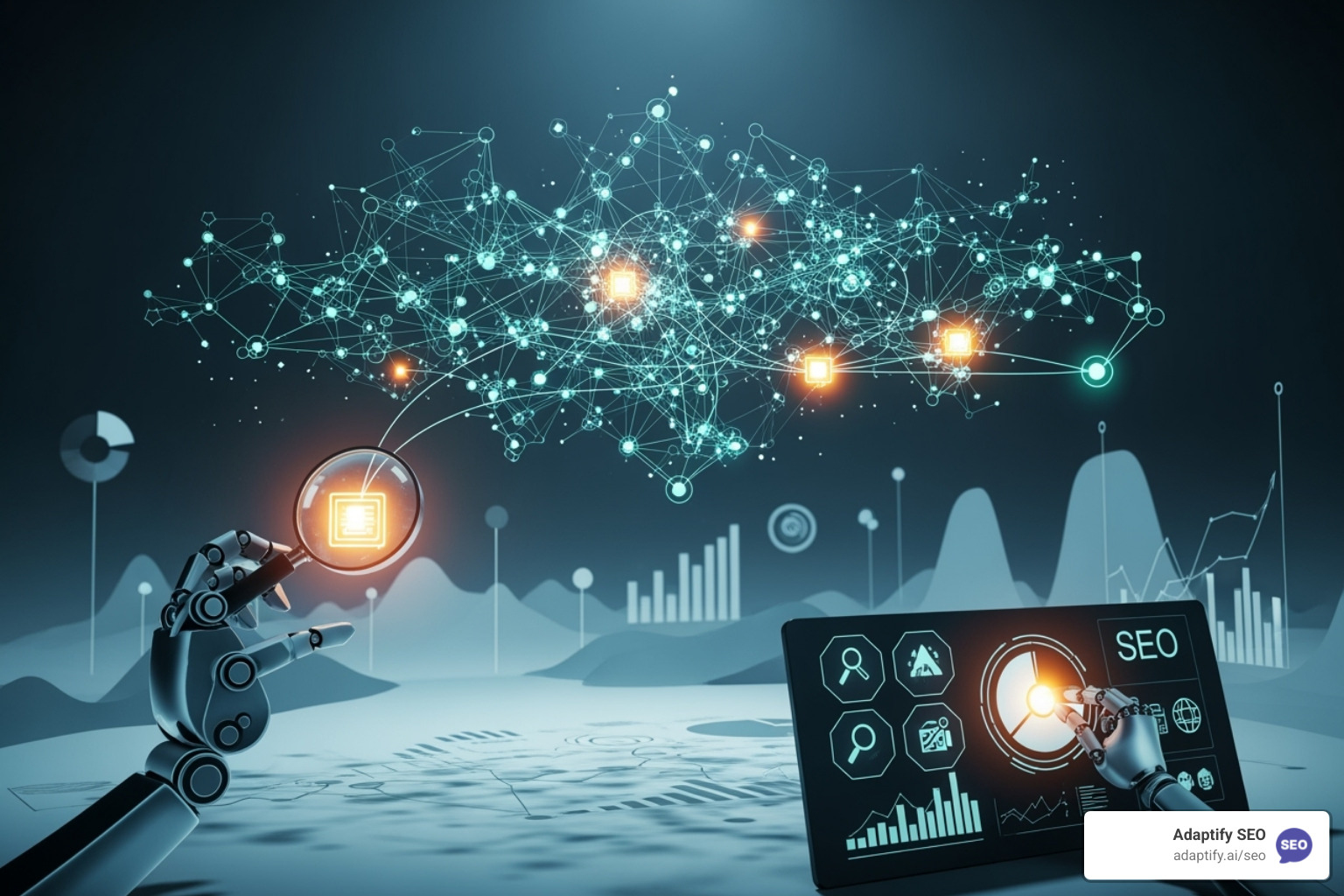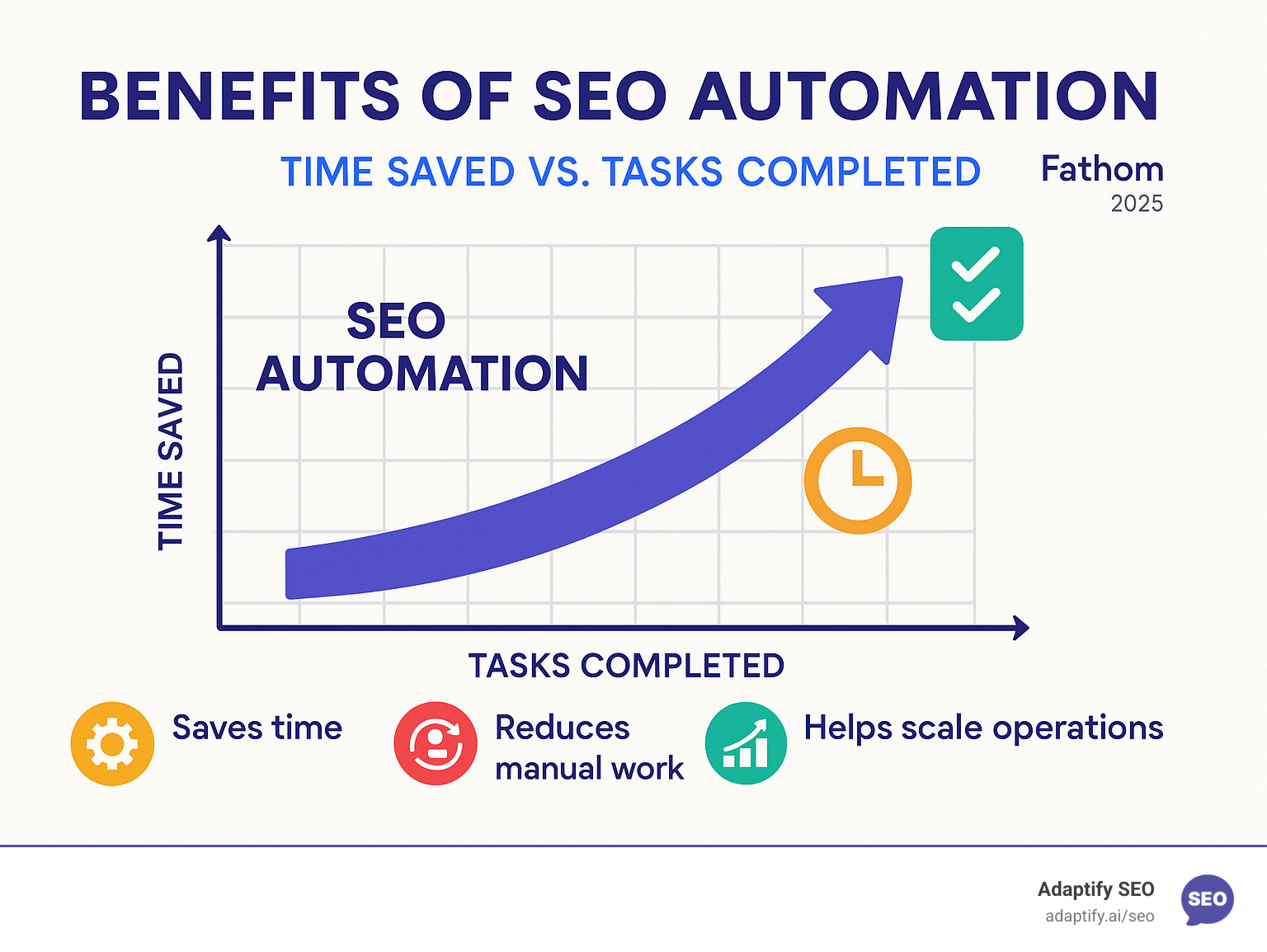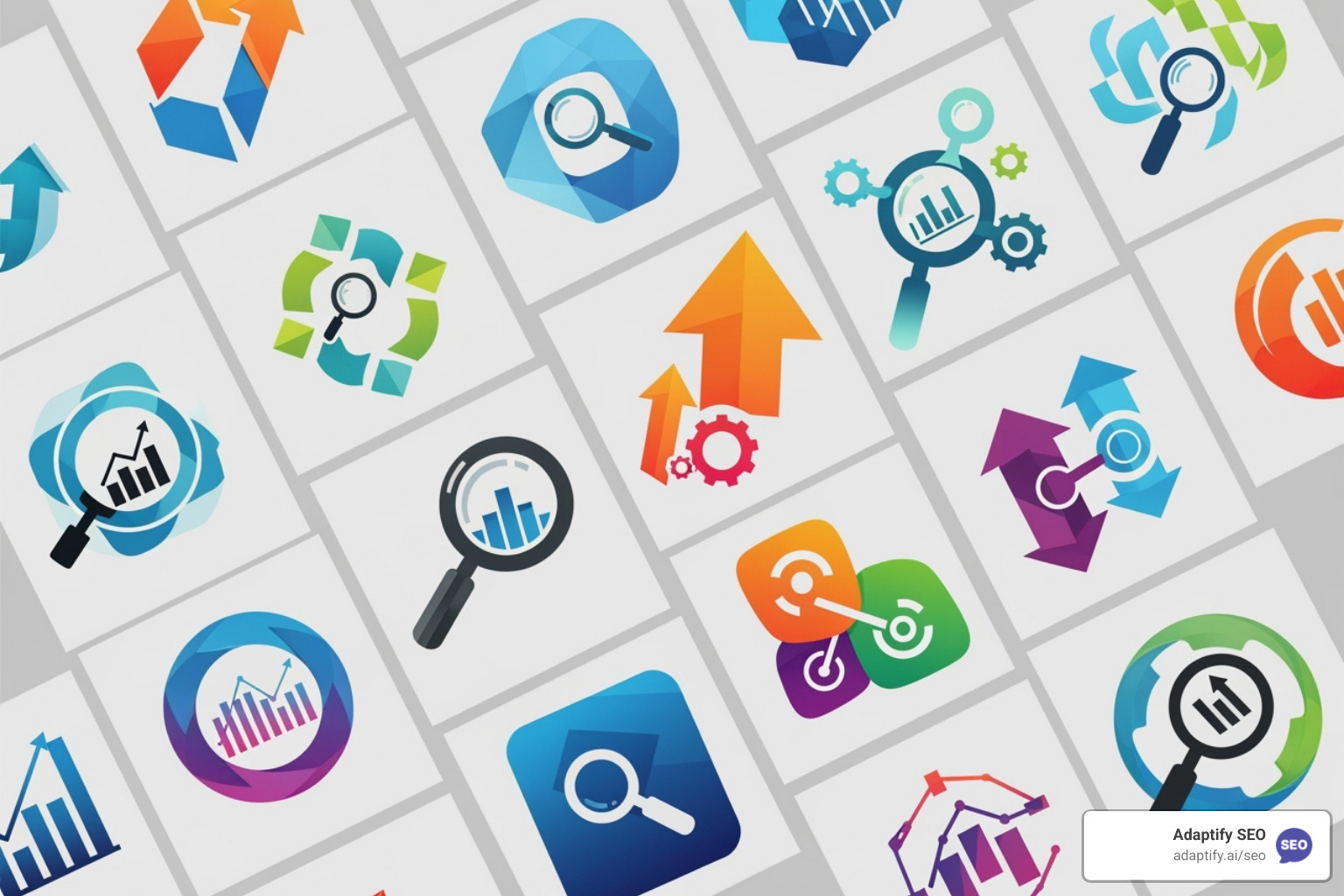AI-Powered SEO: Automate Your Way to the Top
Hansjan Kamerling
Jul 31
What is SEO Automation and Why Should You Care?

Search engine optimization automation uses software and tools to handle repetitive SEO tasks, freeing up time and resources to make your SEO efforts more efficient.
- What it is: Using tools and AI to perform SEO tasks automatically.
- Key benefits: Saves time, reduces manual work, boosts productivity, and helps scale operations.
- Core components: AI, machine learning, and specialized SEO software.
SEO often involves tedious, time-consuming tasks. For agency owners, this means less time for strategy and client relationships. Search engine optimization automation uses smart software to do the heavy lifting, optimizing your workflow and improving campaign results. Automating these tasks saves significant time and money, allowing your team to focus on bigger-picture strategies.
"More than 90% of workers recently surveyed said automation solutions increased their productivity, and 85% said these tools boosted collaboration across their teams."
This shift benefits SEO agencies aiming to scale, digital marketing teams, e-commerce managers looking for faster growth, and busy founders needing efficiency.

The Core Benefits of Automating Your SEO
The shift to an automated approach fundamentally transforms how we approach SEO, opening up significant advantages:
- Increased Efficiency: Automation handles grunt work like data collection and routine audits. Instead of manually tracking hundreds of keywords, a tool does it constantly, freeing your team to analyze trends.
- Faster Results: With tasks executed at machine speed, you can implement changes much quicker. One source showed landing page production time falling from 8 hours to 2-3 hours, allowing for rapid iteration and quicker impact on rankings.
- Data-Driven Decisions: Automation tools excel at collecting and processing vast amounts of data. This arms you with comprehensive insights that reveal patterns and identify opportunities, replacing guesswork.
- Competitive Advantage: By automating your SEO, you can respond to algorithm updates, competitor moves, and market shifts with greater agility, helping you stay ahead of the curve.
- Improved ROI: Time and resource savings directly translate into a better return on investment. When your team spends less time on tedious tasks, every dollar invested in SEO goes further.
At Adaptify.ai, we're all about helping you achieve these benefits. You can find more info about our SEO services and how we can help you streamline your operations.
Who Can Benefit from SEO Automation?
The beauty of search engine optimization automation is its broad applicability:
- SEO Agencies: Manage numerous clients and scale services without a proportional increase in headcount. Automation helps maintain consistency and deliver faster results across all campaigns.
- In-house Marketing Teams: Free up valuable internal resources to focus on brand building and creative campaigns rather than repetitive SEO tasks.
- E-commerce Brands: Automation is a game-changer for optimizing vast, constantly changing product pages, ensuring listings are always primed for search.
- Small to Medium-sized Businesses (SMBs): Gain enterprise-level SEO capabilities at a fraction of the cost, allowing them to compete more effectively.
- Freelancers: Act as a force multiplier, enabling independent consultants to take on more clients and deliver higher-quality results.
- Website Owners: Even non-experts can use automation for basic site audits or content optimization to significantly improve visibility and organic traffic.
What SEO Tasks Can You Automate?
The scope of what can be automated in SEO is constantly growing, thanks to advancements in artificial intelligence (AI) and machine learning. A huge chunk of your SEO workflow can now be handled by smart tools, freeing you up for more strategic, human-centric tasks.

This is possible through technologies like APIs (Application Programming Interfaces) for data sharing, AI models (using machine learning and natural language processing) for analysis and content generation, and Web Crawlers for site scanning.
Let's explore the specifics of what these automated helpers can tackle:
On-Page and Content Automation
This is where AI and automation shine, especially for speeding up content creation and optimization.
- Keyword Clustering: Automated tools analyze search intent to group related keywords, ensuring your content covers topics comprehensively.
- Topic Generation: AI-powered tools can brainstorm content topics based on your niche and keywords, and even provide outlines for high-volume production.
- Content Briefs: Automation crafts detailed content briefs in minutes, pulling in target keywords, heading ideas, and competitor data to guide writers.
- Meta Tag Optimization: AI can generate unique and compelling meta titles and descriptions at scale, a game-changer for sites with thousands of pages.
- Internal Linking Suggestions: Automated tools analyze your site structure to suggest smart internal links, helping users and search engines steer your site.
- Image Optimization: Automation can handle resizing, compressing, and identifying missing alt texts to ensure your visuals are web-ready.
Google has clarified its focus is on the quality of content, not how it was produced. If AI helps you create high-quality, helpful, and original content, that's perfectly acceptable. At Adaptify.ai, our content services leverage AI to create impactful content that gets results.
Technical SEO and Reporting Automation
Many crucial aspects of technical SEO can be automated, saving you countless hours.
- Site Audits: Automated crawlers perform regular site audits, scanning for issues like broken links, crawl errors, and slow pages, then provide actionable recommendations.
- Rank Tracking: Tools continuously monitor your target keywords across search engines and locations, providing real-time updates and historical data.
- Backlink Monitoring: Automated tools alert you to changes in your backlink profile—new, lost, or potentially harmful links—and help you find new opportunities.
- Performance Monitoring: These tools track key indicators like traffic changes and indexing status, notifying you of sudden drops or spikes so you can quickly diagnose issues.
- Core Web Vitals Analysis: Tools can continuously monitor important page experience metrics like loading speed, interactivity, and visual stability.
- Schema Markup Generation: AI tools can automatically create the correct schema code for various content types, increasing your chances of getting rich results in search.
- Automated Reporting: One of the biggest time-savers is automated reporting. Tools pull data from Google Search Console, Analytics, and other platforms into custom dashboards (e.g., using Looker Studio). This saves hours on manual compilation and provides clear, up-to-date insights. The Google Search Console API powers many of these capabilities.
The Best Search Engine Optimization Automation Tools in 2024
Alright, let's talk tools! The world of search engine optimization automation is buzzing with options. The key is to build a complementary toolkit, combining all-in-one platforms with niche tools to fit your unique needs.

You'll find everything from large, all-in-one platforms to focused niche tools, both free and paid. As someone who leverages technology for SEO, I'm excited to walk you through some top picks.
For All-in-One Agency Management: Adaptify.ai
For agencies juggling multiple clients, Adaptify.ai is built to streamline your entire SEO workflow. Our platform is a comprehensive, automated solution designed to slash manual effort and boost your efficiency. We offer automated strategy formulation, high-quality AI content creation, and PR link building automation.
A huge win for our agency partners is our white-label solutions. This means you can offer our cutting-edge search engine optimization automation services seamlessly under your own brand, strengthening client relationships and expanding your offerings. Our platform offers incredible scalability and end-to-end SEO management, from initial strategy to ongoing optimization and reporting. Want to see how we can empower your agency? Find more info about our white-label solutions right here.
For Technical Audits: Screaming Frog & Google Tools
Technical SEO is the foundation of a healthy website. Screaming Frog SEO Spider is a meticulous detective that crawls your site to find broken links, redirect chains, and duplicate content. Google's free tools are also essential: Google Lighthouse audits performance and accessibility, Google PageSpeed Insights offers tips to make pages load faster, and the Google Rich Results Test validates your structured data.
For Content & Research: ChatGPT & Google Keyword Planner
For content and research, large language models like ChatGPT are game-changers for brainstorming topics and generating drafts (always with human oversight and fact-checking). For solid keyword data, the free Google Keyword Planner is a must-have for finding new keywords and checking search volumes. Google Trends is also handy for understanding topic popularity over time and informing your content strategy.
For Automated Reporting: Looker Studio
Looker Studio (formerly Google Data Studio) excels at automated reporting. This free data visualization tool lets you build beautiful, custom dashboards by integrating data from sources like Google Search Console and Google Analytics. It eliminates manual spreadsheet work and makes client reporting professional and effortless.
Choosing Your Toolkit: What to Look For in an Automation Platform
Selecting the right SEO automation tool requires matching its capabilities to your specific needs. Don't just go for the platform with the most features; find the one that solves your biggest problems and fits your situation.

When evaluating platforms, consider these factors:
- Key Features: Does the tool do what you need, whether it's content creation or technical audits?
- Ease of Use: An intuitive interface ensures your team will actually use the tool consistently.
- Integration Capabilities: It must connect seamlessly with your existing tools like your CMS and analytics platforms.
- Scalability: Can the platform grow with your agency and client base?
- Customer Support: Responsive support is invaluable when you run into issues.
- Pricing and ROI: Look beyond the sticker price. Use free trials to test compatibility. At Adaptify.ai, our pricing is structured to offer value at any scale.
Key considerations for your search engine optimization automation strategy
Beyond the tool itself, successful automation requires thoughtful planning. Your strategy should be guided by:
- Business Objectives: Are you focused on increasing organic traffic, improving conversions, or scaling content production?
- Team Size and Expertise: All-in-one solutions often suit smaller teams, while larger teams might prefer a suite of integrated niche tools.
- Budget: Factor in subscription costs, potential training time, and implementation resources.
- Data Accuracy: Your strategic decisions will be based on automated insights, so the platform must provide reliable information.
- User Experience: A clear dashboard and a smooth onboarding process are critical for long-term adoption and success.
The Human Element: Where Automation Ends and Strategy Begins
While search engine optimization automation is incredibly powerful, it's a tool to assist, not replace, human intelligence and creativity. Think of it as a brilliant research assistant who handles repetitive tasks, but you remain the strategist making the big decisions.

Automation lacks the nuance and context that humans provide. It can't grasp subtle humor or the emotional undertones that make content truly connect with readers. Human oversight is needed to adapt to algorithm changes and ensure ethical, accurate content.
This is where the human element is essential for:
- High-Level Strategy: Interpreting trends and making bold moves based on market understanding.
- Creative Input & Brand Voice: Ensuring content sounds authentic and not robotic.
- E-E-A-T (Experience, Expertise, Authoritativeness, Trust): These qualities, which Google values, can't be faked by algorithms and require genuine human involvement. Thought leadership content is a perfect example.
- Building Relationships: Link building and community engagement require genuine human connection.
Tasks to Avoid Fully Automating
While automation is a huge help, some areas demand a human touch:
- Final Content Approval: An expert eye is needed to catch errors and nuance.
- High-Level Strategic Planning: This requires creative problem-solving beyond data.
- Competitor Analysis Interpretation: Understanding the why behind competitor moves.
- Link Building Outreach Personalization: Generic emails don't build the relationships needed for quality backlinks.
- Brand Voice and Tone: Maintaining brand personality requires human oversight to ensure your authentic voice shines through.
Frequently Asked Questions about SEO Automation
It's natural to have questions when exploring new ways to boost your SEO efforts. Let's tackle some of the most common ones about search engine optimization automation.
What is the main purpose of search engine optimization automation?
The main purpose is to use software to handle repetitive, time-consuming SEO tasks. This frees up human experts to focus on high-level strategy, creativity, and client relationships, leading to greater efficiency and scalability. It allows you to shift from endless busywork to impactful, strategic work.
Will Google penalize me for using AI and automation in SEO?
No. Google's focus is on the quality and helpfulness of content, not its production method. Using AI to create high-quality, original content that is reviewed and refined by a human expert is perfectly acceptable. Automation for technical tasks like site audits and reporting is standard industry practice and is not penalized.
Are SEO automation tools worth the cost?
Yes, for most businesses and agencies, the ROI is substantial. By drastically reducing the time spent on tasks like content creation or technical audits, teams can scale their output and achieve faster results. The efficiency gains and improved organic performance typically far outweigh the investment, making it a smart move to work smarter, not just harder.
Conclusion: Work Smarter, Not Harder
In the dynamic world of digital marketing, search engine optimization automation isn't just a trend; it's a fundamental shift in how we approach SEO. As I've explored, it empowers businesses and agencies to reclaim valuable time, boost efficiency, and achieve faster, more impactful results. From automating tedious technical audits to streamlining content creation and reporting, the benefits are clear and tangible.

The future of SEO is undeniably intertwined with AI. As AI models become more sophisticated, their role in assisting SEO professionals will only grow. The key to success, however, lies in a strategic implementation that balances the raw power of automation with the irreplaceable value of human expertise. Automation handles the repetitive, data-heavy tasks, while human intelligence provides the creativity, strategic vision, and nuanced understanding that truly differentiate a brand.
My team and I at Adaptify.ai are passionate about helping agencies leverage this powerful synergy. We believe in providing solutions that allow you to work smarter, not harder, enabling your agency to scale and deliver exceptional results for your clients.
Ready to see how search engine optimization automation can transform your agency's workflow and client success?
Book a Demo at https://adaptify.ai/seo

